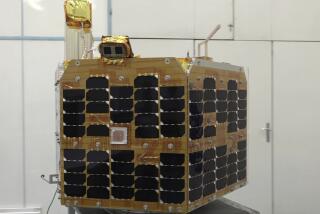Europe Rocket Launch Delayed at Last Second
- Share via
KOUROU, French Guiana — Mission controllers Wednesday night halted the 17th launching of Europe’s Ariane rocket seconds before it was to blast off from a new launching pad and carry two satellites into orbit.
Officials at the French National Center for Space Studies said they will try again tonight or Friday to launch the rocket, scheduled to carry an American and a Brazilian satellite into orbit.
The officials said the rocket, Europe’s competitor to the U.S. space shuttle, may face even longer delays.
The reason why the countdown was halted was uncertain. The countdown had been progressing smoothly before the unidentified problem arose.
The three-stage disposable rocket will carry into orbit a $64-million telecommunications satellite for a subsidiary of the U.S. company GTE Corp., and the $43-million Brasilsat-2 satellite, to be used by Brazil to route telephone calls, telex messages and television signals.
Both satellites were to be sent into geostationary orbits 22,500 miles above the earth.
4 Others Orbited
GTE-Spacenet has sent four other satellites into orbit by Ariane. Brasilsat-1 was also launched by the European rocket.
Arianespace, the Western European consortium building and marketing the unmanned rockets, said it could be able to launch rockets up to 10 times per year with the newest rocket model, Ariane III.
Officials of Arianespace said they are in the midst of their busiest year ever, with six other launches due to orbit 10 more satellites before 1987.
The officials announced last month that they hoped to provide space on the rocket in 1987 and 1988 for customers unable to send satellites into orbit due to the setback in the U.S. shuttle program.
They said they have made room for eight more satellites, which could mean up to $300 million in new business for the European Space Agency and maintain its 50% share of the global satellite market.
Mission controllers were attempting to make the rocket the 14th successful launch in 17 tries. The last rocket, launched Feb. 21, successfully carried into orbit France’s first observation satellite and Sweden’s first satellite. Both are reported functioning normally.
It was the first successful Western space mission since the Jan. 28 explosion of the U.S. shuttle Challenger. All seven astronauts aboard died.
On Sept. 12, an Ariane rocket malfunctioned and had to be blown up less than five minutes after launch to avoid threatening populated areas near the launch site.
More to Read
Sign up for Essential California
The most important California stories and recommendations in your inbox every morning.
You may occasionally receive promotional content from the Los Angeles Times.










